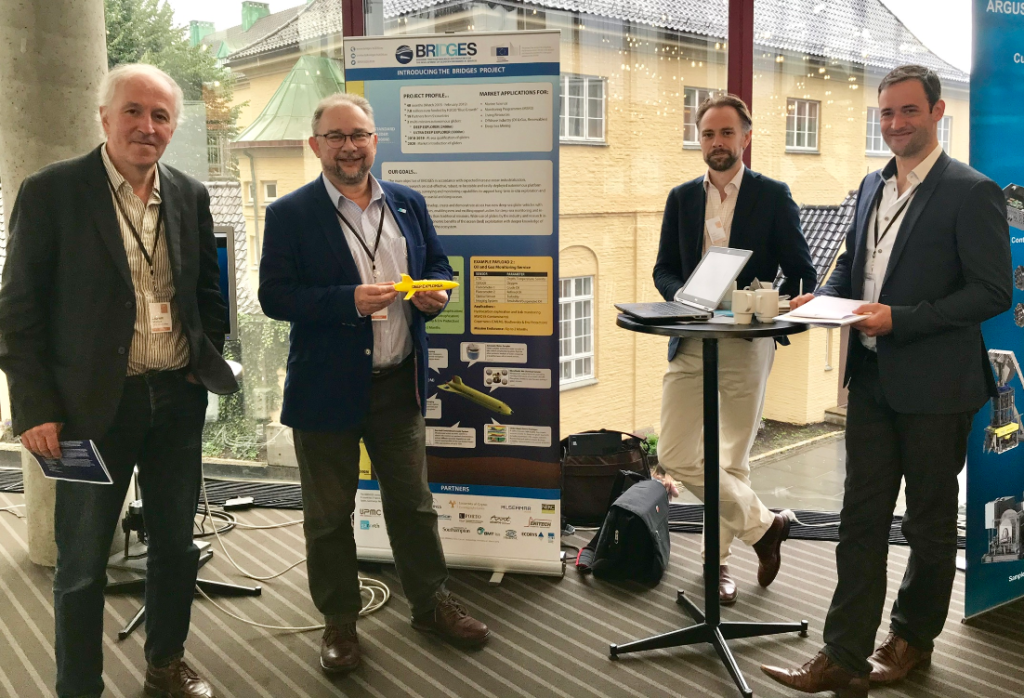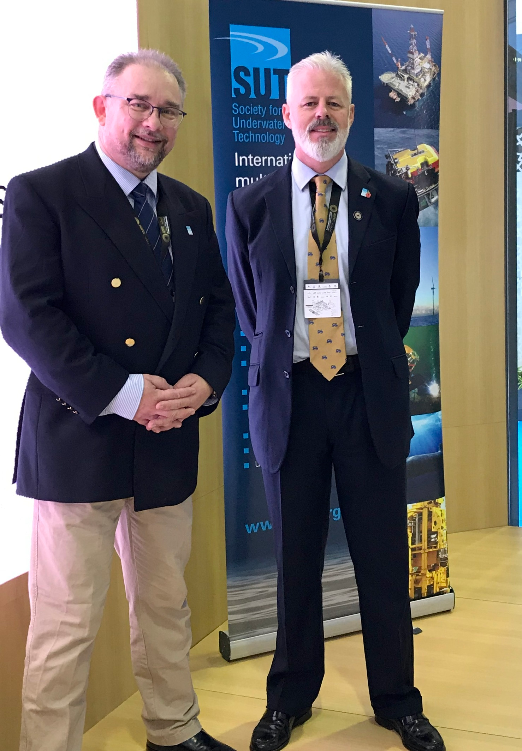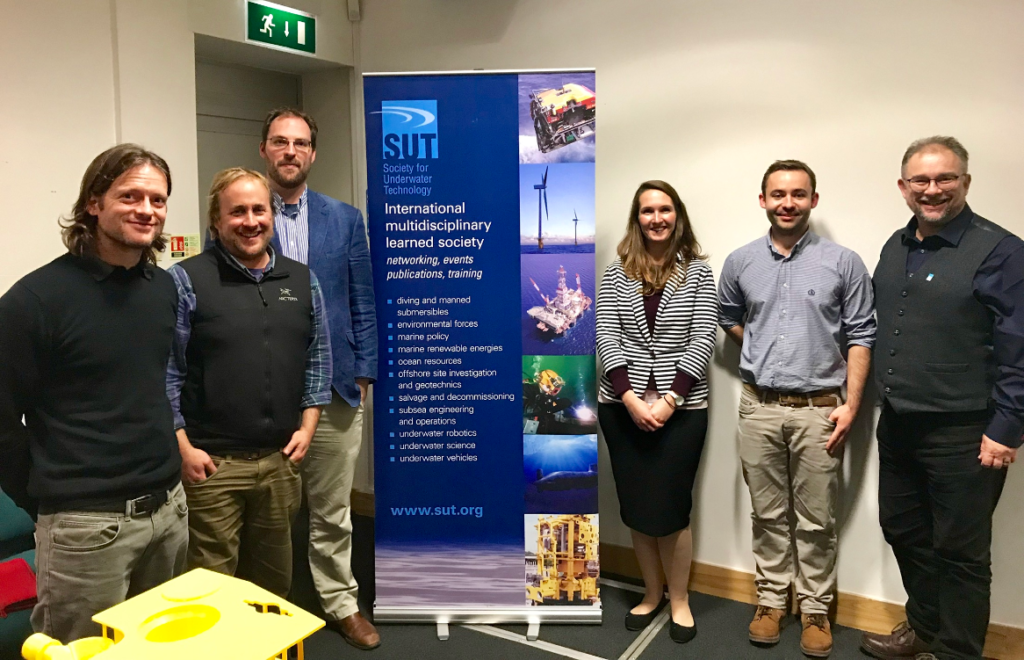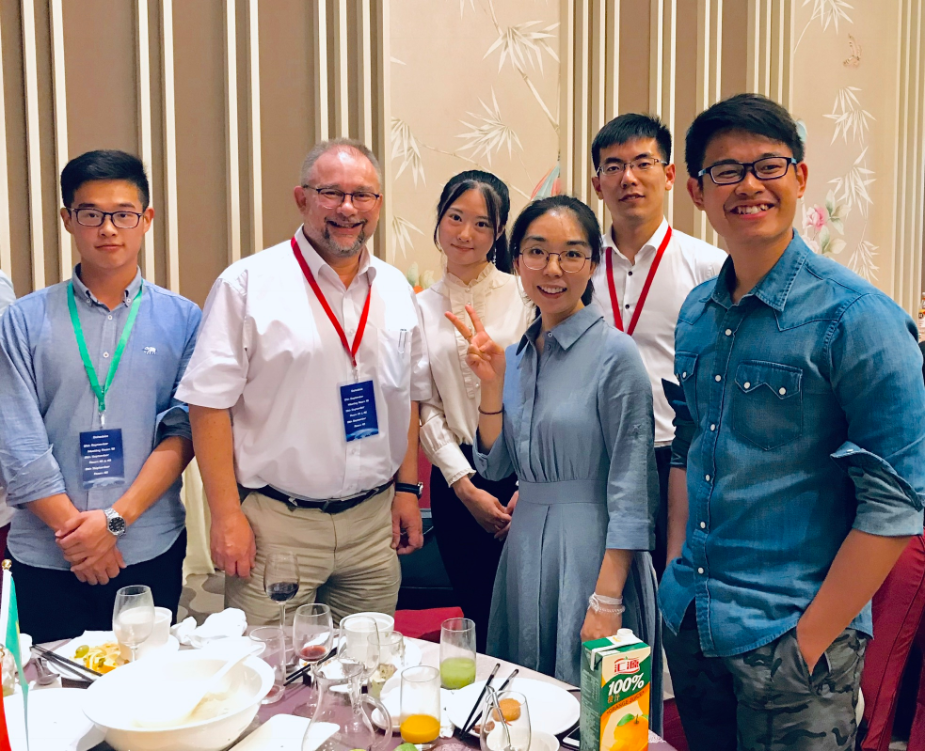Dear members and friends of SUT – it’s been a very busy last six months for me and the Headquarters team as we work hard to raise SUT’s profile within the broad underwater technology sector. I’ve spent a lot of time on the road meeting members, promoting our Society with decision makers in government and international bodies (we’re an Observer Member of UNESCO’s Intergovernmental Oceanographic Commission, and members of the UK government’s Marine Science Coordination Committee marine industries liaison group, the Underwater Sound Forum and Parliamentary & Science Committee for starters), interacting with academia and industry at conferences & trade shows, joining into the work of our committees and winning new friends and contacts in the sectors where we need to expand our activities to meet the challenges of a changing industry, and help provide solutions to new societal needs.
Highlights have included presenting on how advanced marine autonomous systems can benefit the future deep-sea mining industry at the Underwater Mining Conference in Bergen in September, Chairing the Marine Autonomous Systems and Sensors workshops at Oceanology China in Qingdao, providing keynote speeches at the joint China-Brazil SUT technology conference in Beijing, and another at the European Marine Science Educator’s Association conference in Newcastle. At the start of December I was invited to present the prestigious Newth Lecture at the Scottish Association for Marine Science in Oban – an honour for me, and to SUT, reflecting that we are taken seriously as experts in underwater technology and especially in how the technology (and SUT!) is going to evolve to help humanity meet the immense challenges that lie ahead – the transition to low-carbon societies, the replacement of internal combustion engines with electric and hydrogen vehicles, the advent of advanced robotic military systems in the underwater arena, sustainable offshore aquaculture, renewable energy, carbon capture & storage, new sensors such as eDNA, and drugs & medicines from the sea – SUT has something to say in all of these fields, and we are already adapting with new Special Interest Groups being formed. We’ll be launching a new Sensors and Instrumentation Group, and a reformed Ocean Resources Group in early 2019, and are quietly building other new links based on our accumulated knowledge of marine autonomous systems.
In addition to the conferences and workshops mentioned above, I represented SUT at many other events including the Renewables UK Manchester conference, a Defence sector event in Glasgow, outreach to the next generation at the Young Marine Biologists Summit in London, and a number of talks at schools and colleges including a splendid opportunity at Dulwich College where I was able to see Shackleton’s legendary open boat the ‘James Caird’ afterwards. Members of SUT’s Education and Training Committee are active supporters of marine education alliances in Europe, North America and via UNESCO, helping to satisfy our need to be active as educators, to be good global citizens, and ensure the continuation of our charitable status.
I’m working with our International Committee, Council and overseas members to see where SUT might grow in the future. Former SUT Council Member Adrian Phillips has done a sterling piece of work to drive up interest in getting SUT off the ground in the Middle East – a region where, surprisingly, we’ve never had a Branch – and at the ADIPEC meeting in the UAE in November we were delighted to see a strong attendance of potential local members, so plans are moving fast now to get SUT Middle East up and running – contact Adrian at [email protected] if you would like to be part of it. Atlantic Canada is another area showing strong interest in hosting a Branch so I’ve met with Paul Ryan and Neil Bose from Memorial University, Newfoundland while they were visiting Europe to discuss the details, as well as talking to senior staff at organisations and companies based in Halifax, Nova Scotia. If it all comes together, I’m hoping to launch an Atlantic Canada Branch of SUT in Q2 2019. We’re also seeing interest from Egypt and Portugal for development further down the line, so watch this space. Throughout the second half of 2018 the SUT West Africa branch has been busy building up numbers and activities under the oversight of our International Committee and HQ staff, with a view to resuming a full range of Branch activities.
Any largely voluntary Society is only able to function through the efforts and goodwill of those who take part in the life of our global network of Branches & student chapters, and without them we would soon cease to exist. We’ve been through a period of financial hardship over the last few years, and had to trim our sails accordingly, but we are gradually emerging into sunnier times. People are starting to attend our subsea awareness courses again across the world, and as old friends retire from industry a new generation of bright, enthusiastic young women and men are taking up the challenge of keeping SUT healthy and relevant.
In the UK the South-West chapter of the London & Southern England branch is growing nicely, bringing new people and areas of interest to SUT from the lively cluster of science, technology and innovation centres in the Bristol-Exeter-Plymouth-Falmouth area. Their London-based colleagues are reaching out into the huge potential membership in the City who work in marine technology insurance, law and policy as well as traditional engineering and science areas, and the Branch held an excellent summer social evening on board the HQS Wellington – evidence that SUT membership is about having some fun as well as serious knowledge exchange and networking. A major challenge faced by LSE Branch is proving to be finding affordable venues for evening meetings in London – if any members have access to suitable facilities we’d very much like to hear from them, I’d far rather be using SUT funds for education, outreach and scholarships than paying high room charges for London venues. The London branch and HQ are also working with the organisers of MCE Deepwater Development to help host the 2019 meeting which takes place in London – see https://mcedd.com for more.
In the United States the Houston Branch has rebranded as SUT-US, has opened new special interest groups, and is reaching out to the West Coast, playing a significant part in working with our good friends at Reed Exhibitions to help develop the conference session at Oceanology Americas San Diego next February (see www.oceanologyinternationalamericas.com) and they’ve also been busy planting a daughter branch in Merida, Mexico. Our US branch provide an excellent scholarship scheme too, raising considerable funds to help support students who will one day enter our industry. I was present for the awards of scholarships and SUT Fellowships in Houston in October, where I also had the chance to meet the excellent student Chapters at Rice, Houston and Texas A&M universities and meet Dr Fathi Ghorbel, chair of the Robotics & Automation Committee at Rice.
Bergen are becoming active again after a long period of quiescence, Singapore has new committee members ready to reach out to the region, Kuala Lumpur are holding a variety of events, and under Professor Frank Lim’s leadership the China Branch promises great things – I wouldn’t be surprised if in 10 years time they are the largest and most active part of SUT, though it does require some hard work over the next couple of years. Perth continue to inspire with their well-run branch, active schedule of activities, and busy group of early-career members. North of England have an enthusiastic, young member base that includes many from the renewables and mining sectors, and Aberdeen provide the solid core of UK activity through their hardworking committee and local SUT staff members. Our Rio branch needs some help as numbers have fallen off sharply there in recent years, but having met with their leadership at the SUT Joint China-Brazil workshop on Underwater Technology I’m confident that Rio will rise back up the rankings as Brazil emerges from recession.
Our student members and early career professionals are the future of the Society and I’m pleased to see that the Student Chapters in the USA, and younger member groups ‘SUT Plus’ in the UK and ‘YES’ (Young Engineers and Scientists) in Australia are doing well. It’s an area we still need to develop across some parts of our international network, as not all of our Branches get fully involved with education, outreach and training yet. Whilst on the subject of training, we are actively exploring how to adapt our existing courses to better meet the needs of the renewables, mining and defence sectors, and in a major new chapter for SUT we are in detailed discussion with a potential provider about opening up access to global Professional Registration for those Members who require such accreditation – more from me on that in the New Year.
We are also considering launching a ‘patrons’ scheme in the New Year, modelled on those used by similar societies around the world – contact me directly if you would like to know more.
SUT is not a trade body, we are above all other things a marine Learned Society that exists to promote marine science and technology to the next generation, to the people already working in our sector, and to decision makers. We disseminate the things our members have learned, and the skills they have developed, through our network of meetings, conferences, other events and of course our peer-reviewed journal ‘Underwater Technology’. I’m told that the number of quality manuscripts submitted for review & publication is falling, so I would like to issue a request to our members and colleagues to consider sharing new knowledge through our journal wherever possible. It raises our profile, helps us deliver knowledge to Society at large, and as the United Nations community enters their Decade for Ocean Science for Sustainable Development (see https://en.unesco.org/ocean-decade) it helps place SUT at the heart of global ocean knowledge delivery. Our journal editor will be delighted to receive your submissions – see www.sut.org/publications/underwater-technology/ for more.
As most of you will know we made a small surplus at the close of our last financial year, the first in a while, but we are still some way from being as financially healthy as we used to be. We need many more members, individual and corporate, and to continue to keep our costs as low as possible. That will mean that increasingly our publications will be electronic rather than printed, and we will be encouraging our committees and working groups to meet remotely where possible. My thanks to our staff who do an incredible job running a society with members in over 40 countries at such a low cost – it’s no small achievement. Thanks too to our Council and Committee Members, who enable SUT to function effectively by their volunteer effort.
I’d like to add a special Thank You to Peter Metcalf, who has just stood down as Chair of SUT Council – he’s helped steer us through difficult times and hard decisions. He was quite rightly awarded our Honorary Fellowship at the AGM on 3rd December, and I wish him well in his busy ‘retired’ life where Peter continues to serve as a School Governor and in other roles that will keep him fully occupied. Peter’s successor as Chair is David Saul, who I’m looking forward to working with as we take SUT forward in a complex, ever-changing world.
Finally may I take the opportunity to wish all of our Members, Fellows, friends and partners a blessed Christmas festival season, be that in the sunshine of Perth, or the snows of Norway and I very much look forward to working with you all in the New Year. I won’t get everything right, we have limited resources of time and finance, but SUT has access to boundless energy, enthusiasm and hard-won knowledge, which we will be able to harness to make the world – especially the global ocean – a better place.
Steve Hall December 2018






